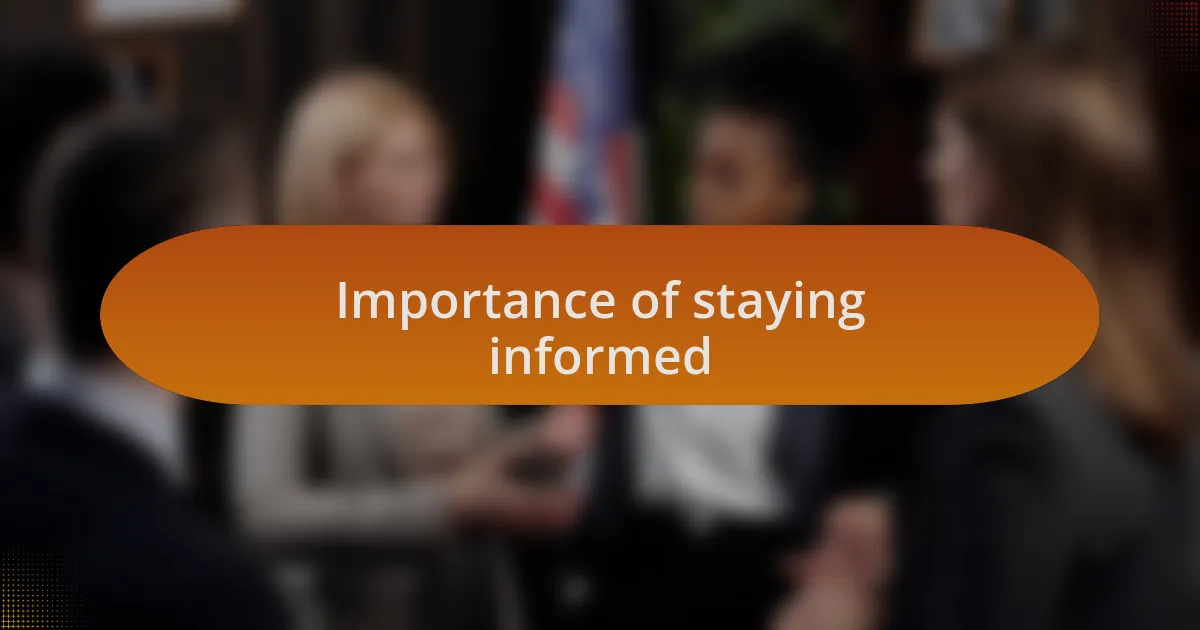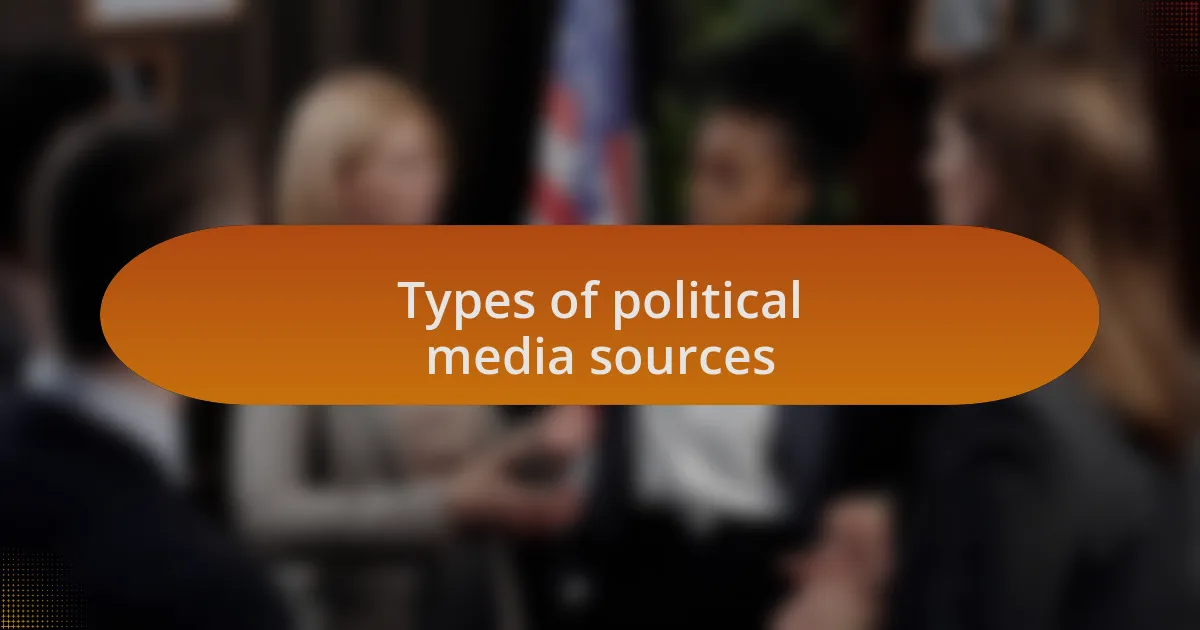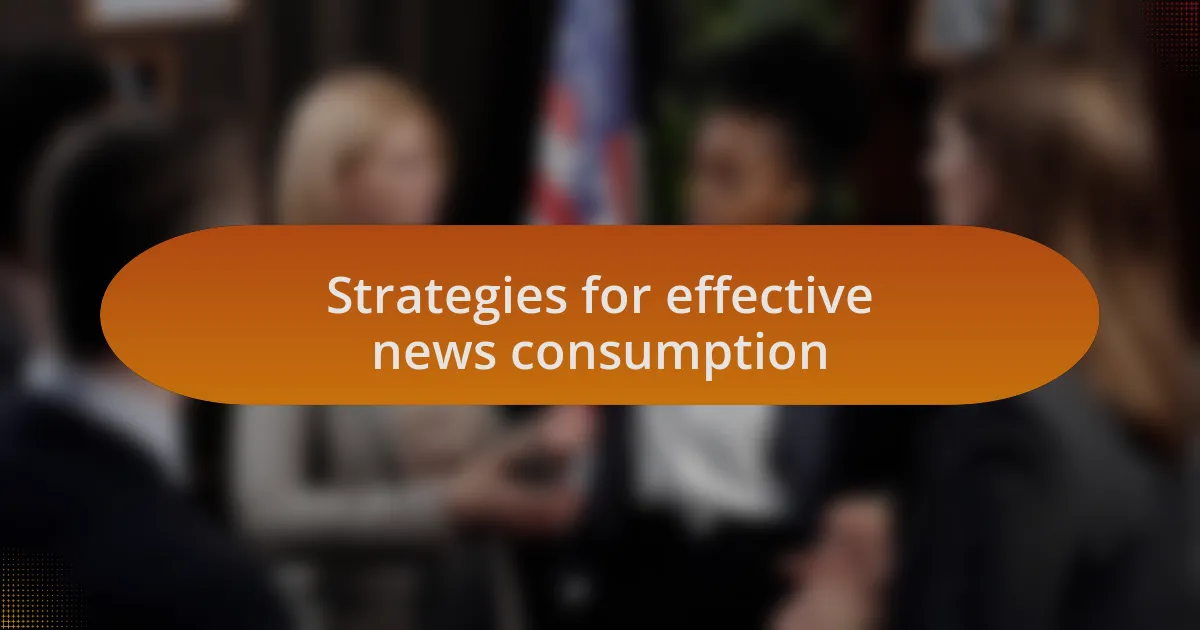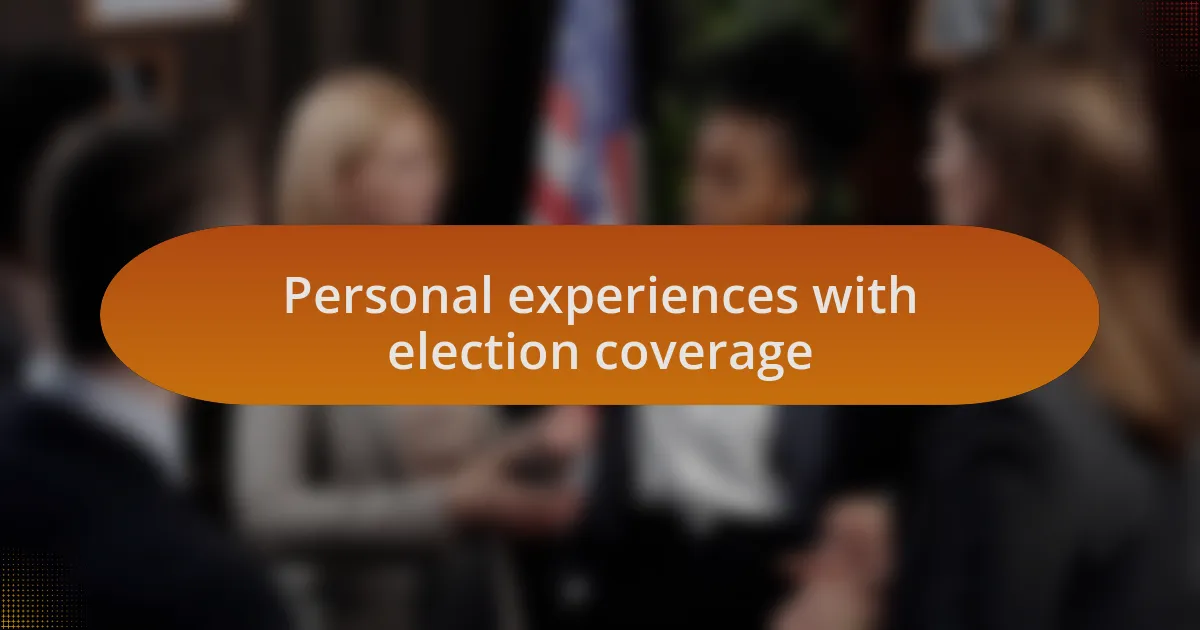Key takeaways:
- Political media platforms are essential for understanding elections but require discernment to identify credible sources and biases.
- Staying informed empowers meaningful civic participation and enhances critical thinking about political beliefs.
- Utilizing diverse media formats, such as podcasts and fact-checking tools, can improve news consumption and reduce misinformation.
- Engagement with various perspectives, both online and offline, fosters a deeper connection to local and national political issues.

Understanding political media platforms
Political media platforms play a crucial role in shaping our understanding of elections. I remember one election cycle where I felt overwhelmed by the sheer volume of information available. How do you sift through it all and find what’s genuinely relevant? This question propelled me to explore diverse sources.
These platforms offer a variety of viewpoints, which can be both enlightening and confusing. I found myself often questioning the motivations behind certain reports. Was the broadcaster leaning towards one political ideology? Such revelations made me more discerning in choosing my sources, helping me navigate the muddled waters of political news.
Moreover, the rise of social media has accelerated the exchange of information, making it easier than ever to stay informed but also harder to identify credible content. Reflecting on my own experiences, I once shared a news article that later turned out to be misleading. This taught me the importance of fact-checking before sharing, fostering a deeper appreciation for the integrity of information found on these platforms.

Importance of staying informed
Staying informed during elections isn’t just a matter of preference; it’s a necessity that shapes our democratic engagement. I distinctly recall a time when I casually skimmed through headlines, only to later realize I had missed critical policy changes that would directly impact my community. How often do we let ourselves be swept away by surface-level narratives? This experience made me recognize that diving deeper into political content truly empowers me to participate meaningfully in civic discussions.
The emotional stakes during election periods can be remarkably high, often elevating anxiety as we grapple with the potential outcomes. I vividly remember the tension in my family during a heated election—it felt like the air crackled with varying opinions. I realized then that the more informed I became, the more confident I felt articulating my own views while respecting others’. It’s fascinating how knowledge can transform contentious conversations into constructive dialogues.
Moreover, staying informed sharpens our critical thinking—not just about what we believe, but about why we believe it. After attending a local town hall meeting, where various positions were passionately debated, I found myself reflecting on my own beliefs and researching candidates beyond campaign slogans. It dawned on me that understanding different perspectives enriches my perspective, turning me from a passive observer into an active participant in the political landscape. Wouldn’t you agree that this proactive approach can lead to a more engaged and informed electorate?

Types of political media sources
Political media sources come in various forms, each offering unique perspectives. I often find that traditional news outlets like newspapers and television news provide in-depth reporting and analysis. However, I noticed that these sources can sometimes be influenced by editorial biases, which made me more conscious about seeking diverse viewpoints. Have you ever caught yourself wondering if what you’re reading paints the complete picture?
Online platforms, such as social media and political blogs, have become powerful tools for engaging with current events. They allow for immediacy and a wide range of opinions, but I’ve learned that this rapid-fire information comes with a risk of misinformation. There was a time when I stumbled upon a viral post that seemed credible but, upon further investigation, was completely false. It sparked a realization about my responsibility as a consumer of information: verifying sources is crucial.
Podcasts and video channels have also shaped how I consume political content. Listening to expert analyses feels as if I’m joining a conversation with knowledgeable friends. I distinctly remember binge-listening to a political podcast during the last election cycle; it deepened my understanding of candidate platforms while keeping me engaged. When you immerse yourself in these varied media, how do you balance information saturation without feeling overwhelmed?

Strategies for effective news consumption
Staying informed during elections requires a deliberate approach to news consumption. I’ve found that setting time limits for news intake helps me avoid the feeling of being engulfed in a constant stream of information. For instance, during the last election season, I allocated specific times each day to catch up on news, which not only made my consumption more manageable but also allowed me to reflect on what I had learned.
Another key strategy is actively seeking out content that challenges my views. I vividly recall a particularly eye-opening moment when I watched a debate featuring candidates from varying political backgrounds. It pushed me to grapple with perspectives that I initially dismissed. Isn’t it fascinating how engagement with opposing viewpoints can reshape our understanding?
Moreover, utilizing fact-checking websites before sharing information has become a part of my routine. In one instance, a friend shared a sensational headline that caught my eye, but a quick fact-check revealed it was misleading. That experience reinforced my belief that sharing responsible information not only informs others but also fosters a healthier political discourse. How do you ensure the information you share is accurate? It’s worth considering the responsibility we hold in shaping conversations around political topics.

Personal experiences with election coverage
I still remember the anxiety I felt during election night coverage a few cycles back. Sitting in front of the television, surrounded by friends, we eagerly waited for the results. It was both exhilarating and nerve-wracking as the maps lit up in red and blue. The excitement reminded me of a sports game, but with stakes that felt far more personal. Have you ever felt that rush? It truly highlights how invested we become in the democratic process.
During that same election, I made a point to engage on social media to gather a diverse array of opinions and reactions. Watching friends share their thoughts in real-time was a unique experience. I found myself slipping into debates that were sometimes heated but often enlightening. This virtual dialogue brought not just different perspectives, but also a sense of community. Have you considered how social platforms can help connect with others around important civic events?
In one memorable moment, I stumbled across a local town hall meeting being streamed live. I had initially planned to skip it, thinking it wouldn’t be riveting. However, I found the discussions about our community’s needs truly compelling. Hearing citizens speak passionately about local issues made me realize how much local elections impact our everyday lives. When was the last time you tuned into something unexpected that changed your perspective? It’s a reminder that staying informed isn’t just about the national stage—it’s also about what’s happening in our own backyards.
![]()
Tools for tracking election updates
Finding the right tools for tracking election updates has been a game-changer for me. During one election cycle, I discovered mobile apps that delivered real-time notifications on results and breaking news. I can’t tell you how many times those alerts kept me from feeling completely lost amid the information overload that usually accompanies election season. Have you ever felt overwhelmed by the constant barrage of news?
One resource I found particularly useful was online platforms that aggregate various news sources. By visiting a website dedicated to covering multiple outlets, I could compare perspectives and gain a more comprehensive understanding of the electoral landscape. This diversity of voices helped me avoid bias; I felt like I was piecing together a puzzle that made the picture clearer and more complete. Have you ever tried focusing on news sources that challenge your viewpoint?
Social media tools have also played a big role in how I stay informed. I learned to use hashtags and follow key political figures and organizations to curate my feed. It transformed my experience from passive consumption to active engagement, making me feel part of the conversation. Plus, seeing trending topics in real-time made me aware of what issues were resonating most with voters. Wouldn’t you agree that being part of that dialogue adds value to our understanding of the electoral process?